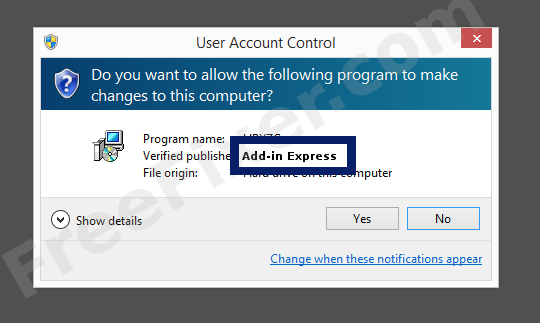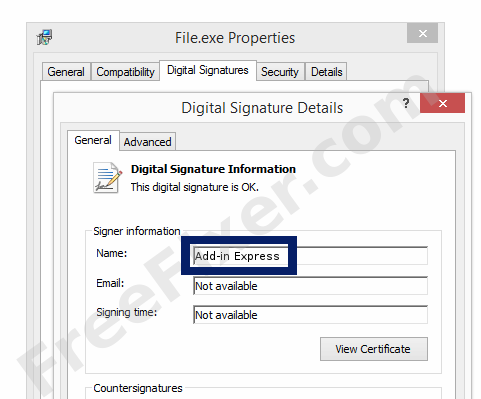Add-in Express - 0% Detection Rate *
Did you just run into a file that has been digitally signed by Add-in Express? If so, please read on.
You will typically notice Add-in Express when double-clicking to run the file. The publisher name is displayed as the "Verified publisher" in the UAC dialog as the screenshot shows:

You can also view the Add-in Express certificate with the following procedure:
- Open Windows Explorer and locate the Add-in Express file
- Right-click on the file and select Properties
- Click on the Digital Signatures tab
- Click the View Certificate button
Here's a screengrab of a file signed by Add-in Express:

As you can see in the screenshot above, the Windows OS reports that "This digital signature is OK". This implies that the file has been published by Add-in Express and that no one has tampered with the file.
If you click the View Certificate button shown in the screenshot above, you can view all the details of the certificate, such as when it was issued, who issued the certificate, how long it is valid, etc. You can also examine the address for Add-in Express, such as the street name, city and country.
VeriSign Class 3 Code Signing 2010 CA and DigiCert SHA2 Assured ID Code Signing CA has issued the Add-in Express certificates. You can also view the details of the issuer by clicking the View Certificate button shown in the screenshot above.
Add-in Express Files
These are the Add-in Express files I have gathered, thanks to the FreeFixer users.
| Detection Ratio | File Name |
|---|---|
| 0/48 | adxregistrator.exe |
| 0/44 | IntResource.dll |
| 0/55 | adxloader.exe |
| 0/56 | AddinExpress.IE.dll |
| 0/49 | adxloader64.exe |
| 0/55 | adxregistrator.exe |
| 0/57 | adxregistrator.exe |
| 0/57 | AddinExpress.MSO.2005.DLL |
| 0/70 | IntResource.dll |
* How the Detection Percentage is Calculated
The detection percentage is based on the fact that I've collected 491 scan reports for the Add-in Express files. 0 of these scan reports came up with some sort of detection. If you like, you can view the full details of the scan reports by examining the files listed above.
Analysis Details
The analysis is done on certificates with the following serial numbers:
- 60185030958e5d2418369f374de20984
- 1c82ca02186bfc89cb451dd9f5369e25
- 0c2a3fd7b191cbb32e488470a49a31e0